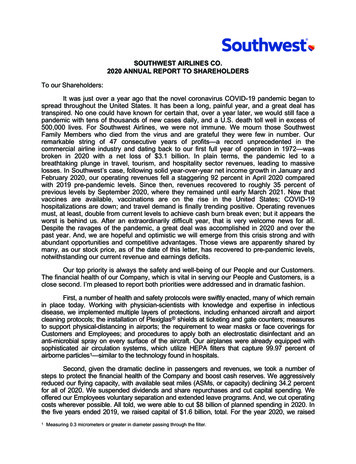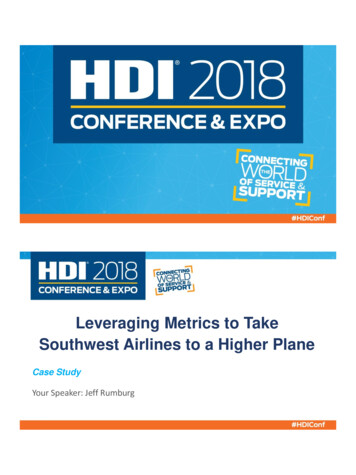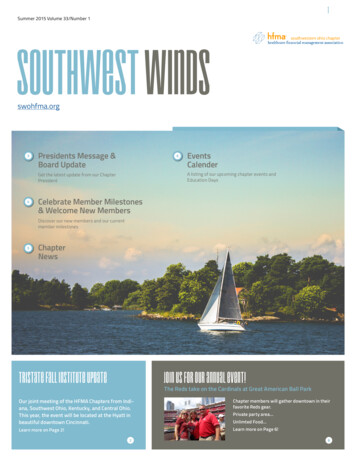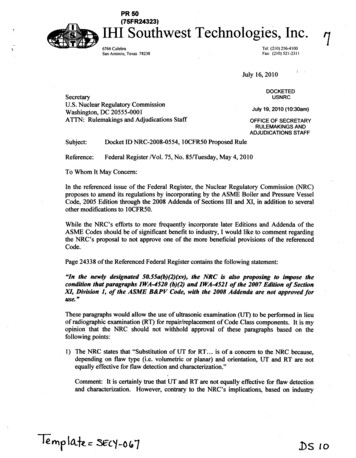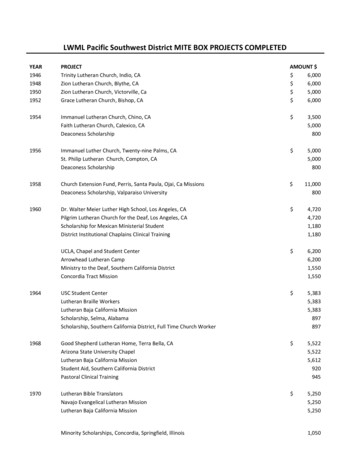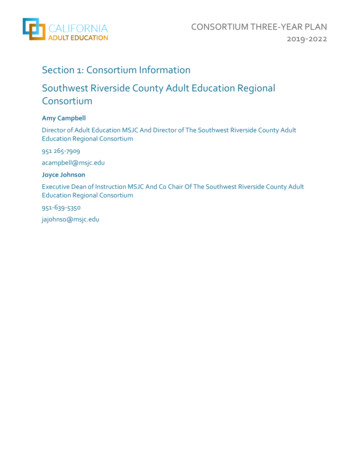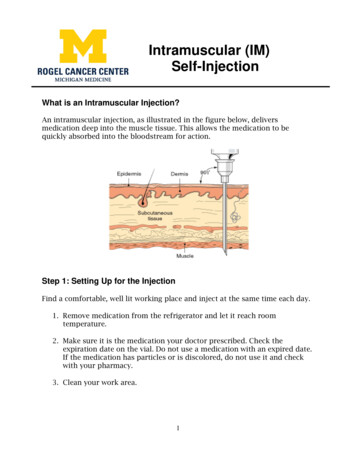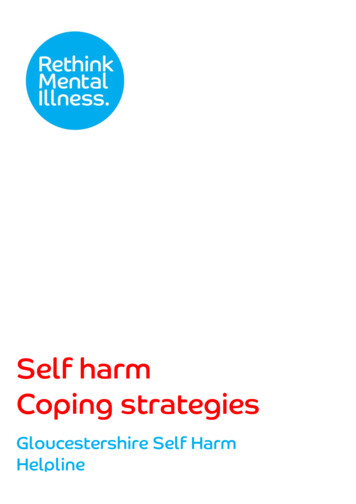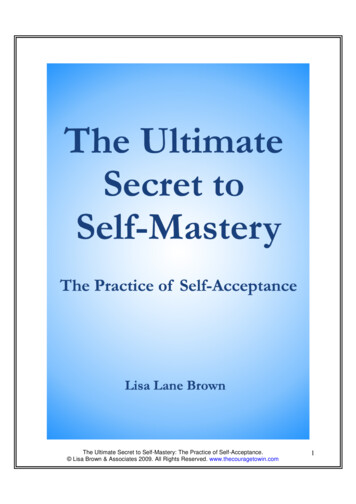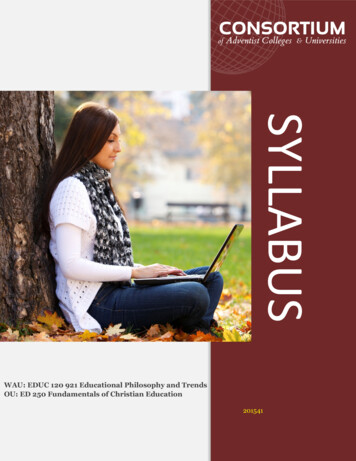
Transcription
SYLLABUSWAU: EDUC 120 921 Educational Philosophy and TrendsOU: ED 250 Fundamentals of Christian Education201541
WAU: EDUC 120 921 Educational Philosophy andTrendsOU: ED 250 Fundamentals of Christian EducationConsortium of Adventist Colleges and UniversitiesSelf-Paced CoursesThis course follows a self-paced online format. You have 180 days from your selected start dateto complete the course. The last day to withdraw with a full refund is 15 days after your startdate.Instructor ContactPlease refer to course in Learning Hub for the teacher contact information.Communication with the InstructorIt is important to remember that while the Internet is available 24 hours a day, your instructor isnot. You can expect that your instructor will respond to e-mail message to you within 2 businessdays during the week and may not be available to respond on weekends.Other AssistanceUsername and password assistancehelpdesk@andrews.edu(269) 471-6016Enrollment and cancellationsBookstoreTechnical assistance with Learning HubTechnical assistance with your AndrewsaccountExam requestsStudent Services Support & FAQsderegister@andrews.edu(269) dlit@andrews.edu(269) s.eduwww.andrews.edu/distance/students/(269) 471-6566Any other questions: sde@andrews.edu, (800) 782-4769 or (269) 471-6570Part 1: Course InformationCourse DescriptionsOakwood UniversityA study of the fundamental principles, concepts, and aims of Christian education.Washington Adventist UniversityAn overview of philosophy and trends in American education salient to the individual, church,and societal issues related to education. Christian perspectives that include the study of E.G.White’s influence on Seventh-day Adventist education will be presented.Course Learning OutcomesThe objective of this course is to help you prepare to demonstrate a proficient understanding ofthe following: Articulate a consistent Christian worldview and philosophy of education. Formulate a personal worldview and philosophy of education.Page 2
Philosophy of Adventist Education SyllabusUnderstand and appreciate the balanced philosophical stance of the Bible.Assess the role of philosophy in developing and implementing educational programs.Identify and explore basic philosophical questions.Compare the major schools of philosophical thought and evaluate how they help answerthe basic philosophical questions.Predict educational implications to the answers of the basic philosophical questions.Evaluate contemporary theories of education and their implications for educationalpractice.Consider the learner, teacher, curriculum, instructional strategies, social policy, andadministration of church-related schools from a Christian perspective.Required Text/MaterialKnight, Georg R. Philosophy and Education: An Introduction in Christian Perspective, 2006.Andrews University Press; 4 edition. ISBN-13: 978-1883925543Optional Text/MaterialThe following materials are required for the course and available online within the course or onthe Internet. If you prefer to have a hard copy of these materials, you may choose to order them.White Ellen.G. Education. Ellen G. White Estate, Inc. 1952. ISBN13: 978-0816318803Credit Hours and CommitmentThis course is offered for 3 semester credits; therefore it is expected that you will spend 135hours total on this course. This course has 12 assignments and 2 exam; so it is recommendedthat you budget about 9 hours for studying and preparing for each assignment or exam.Suggested schedule(s) to accomplish this work are included in this syllabus.Part 2: Course Methods and DeliveryCourse/Technical Requirements Internet connection (DSL, LAN, or cable connection desirable).LearningHub AccessThis course is delivered online through LearningHub at http://learninghub.andrews.eduYour username and password are your Andrews username and password. You need to activateyour username and password to access LearningHub.Please do this online ion/information.jsp if you haven’talready. (269) 471-6016 or email helpdesk@andrews.edu if you need assistance.If you need technical assistance at any time during the course, or to report a problem withLearningHub, please email dlit@andrews.edu or call 269-471-3960.Page 3
Philosophy of Adventist EducationSyllabusPart 3: Course RequirementsImportant Note: Activity and assignment details will be explained in detail within eachlearning module. If you have any questions, please contact your instructor.Your ScheduleIn Learning Hub, you will access online lessons, course materials, and resources. This course isself-paced. You must complete the course within 180 days. This is the Consortium policy. Youmay have a stricter deadline imposed by graduation, financial aid, or other restrictions.Start by creating a schedule for completion of the course. Determine your deadline. Do you need a transcript sent to your home institution? Working from your deadline, count backwards. Allow 2 weeks after you take your finalexam for your final grade to be calculated. Allow another 2 weeks for the transcript to beprocessed and sent. Now use the suggested schedules to create a schedule for yourself that ensurescompletion 4 weeks before your deadline.Submit your course plan to your instructor within Learning Hub AND discipline yourself tomake regular progress.ExamsAll exams must be supervised by a school or community official, such as a teacher, librarian,registrar, or pastor, who is not related to the student.The exam request form will available in Learning Hub after you have completed the assignmentsprior to the exam. The student must state clearly on the exam request form the professionalstatus, job title, or any other qualifications of the supervisor that will aid the testing departmentin the approval process. If you are attending a college or university, you must use the testingcenter at that institution. A student living near the Andrews University School of DistanceEducation main office in Michigan must have the exams supervised at the School of DistanceEducation testing office. However, the exam request should be sent in ahead of time.You are allowed 150 minutes to complete the midterm and final exam. You must bring yourphoto ID to the exams. The midterm and final exam are each worth 12.5% of your grade.An online exam code cannot be sent to a supervisor who has the same address as the studentunless the address is known to be that of a school, mission facility, etc.All college students must present photo identification to their supervisor’s before taking exams.If you cannot take your exam by the deadline date, email sdeexams@andrews.edu.Suggested schedule for completion in 8 weeks:WeekModule(s)Intro Introduction and OrientationReadingsActivitiesOrientationWriting ExpectationsSubmit ScheduleTell About MePage 4
Philosophy of Adventist ademic Honesty1Lesson 1: The Nature of Philosophy and EducationRead Philosophy and Education ChaptersAssignment 11 and 2 (pages 3-38).Lesson 2: Traditional and Modern PhilosophiesRead Philosophy and Education ChaptersAssignment 23 and 4 (pages 41-88).Lesson 3: PostmodernismRead Philosophy and Education Chapter 5Assignment 3(pages 89-102).Lesson 4: Contemporary Theories of EducationRead Philosophy and Education ChaptersAssignment 46 and 7 (pages 103-160).Lesson 5: Building a Personal Philosophy ofEducationRead Philosophy and Education Chapter 8Assignment 5(pages 163-168).23Midterm Exam4Lesson 6: A Christian Approach to PhilosophyRead Philosophy and Education Chapter 9Assignment 6(pages 169-201).Lesson 7: A Christian Approach to EducationRead Philosophy and Education ChaptersAssignment 710 and 11 (pages 203-279).Lesson 8: Principles of True EducationRead Education pages 13-96.Assignment 8Lesson 9: Nature TeachingRead Education pages 99-222.Assignment 9Lesson 10: Character BuildingRead Education pages 225-309.Assignment 10567Assignment 11: School Analysis ReportAssignment 12: Philosophy Statement8Semester ExamSuggested schedule for completion in 14 weeks:WeekModule(s)Intro Introduction and OrientationReadingsActivitiesOrientationWriting ExpectationsSubmit ScheduleTell About MeAcademic Honesty1Lesson 1: The Nature of Philosophy and EducationRead Philosophy and Education ChaptersAssignment 11 and 2 (pages 3-38).2Lesson 2: Traditional and Modern PhilosophiesRead Philosophy and Education ChaptersAssignment 23 and 4 (pages 41-88).3Lesson 3: PostmodernismRead Philosophy and Education Chapter 5Assignment 3(pages 89-102).4Lesson 4: Contemporary Theories of EducationRead Philosophy and Education ChaptersAssignment 46 and 7 (pages 103-160).5Lesson 5: Building a Personal Philosophy ofEducationRead Philosophy and Education Chapter 8Assignment 5(pages 163-168).6Midterm Exam7Lesson 6: A Christian Approach to PhilosophyRead Philosophy and Education Chapter 9Assignment 6(pages 169-201).8Lesson 7: A Christian Approach to EducationRead Philosophy and Education ChaptersAssignment 710 and 11 (pages 203-279).9Lesson 8: Principles of True EducationRead Education pages 13-96.Assignment 810Lesson 9: Nature TeachingRead Education pages 99-222.Assignment 911Lesson 10: Character BuildingRead Education pages 225-309.Assignment 1012Assignment 11: School Analysis Report13Assignment 12: Philosophy Statement14Semester ExamPage 5
Philosophy of Adventist EducationSyllabusCompleting AssignmentsAll assignments for this course will be submitted electronically through Learning Hub unlessotherwise instructed. Assignments and exams must be completed within 180 days of courseregistration date. This timeframe is subject to change depending on deadlines set by your homeinstitution.No exam is returned to the student or supervisor. Test grades are sent to the student as soon asthe exam is graded. Feedback from the instructor for midterm exams will provide informationfor studying for future exams.Part 4: Grading PolicyGraded Course ActivitiesYour final grade will be the result of three components: Assignments (1-10) (50%), AnalysisReport (12.5%), Philosophy Statement (12.5%), Midterm Exam (12.5%), and Semester Exam(12.5%). You will need to complete every Assignment, Report, the Midterm Exam, and theSemester Exam before a grade can be issued.Percent %5012.512.512.512.5100DescriptionAssignments 1 10School Analysis Report (Sub 11)Philosophy Statement (Sub 12)Midterm ExamSemester ExamTotal Percent PossibleViewing Grades in Learning Hub Click into the course. Click on the Grades link in the Settings Box to the left of the main course page.Letter Grade AssignmentLetter GradePercentageA93-100%A-90-92%B 88-89%B83-87%B-80-82%C 78-79%C73-77%C-70-72%D60-69%F0-59%Page 6
Philosophy of Adventist EducationSyllabusPart 5: Course PoliciesWithdrawal and Incomplete PoliciesThe current withdrawal policy can be found online wal.html. The incomplete policy is foundonline at pletes.html.Maintain Professional Conduct Both in the Classroom and OnlineThe classroom is a professional environment where academic debate and learning take place.Your instructor will make every effort to make this environment safe for you to share youropinions, ideas, and beliefs. In return, you are expected to respect the opinions, ideas, andbeliefs of other students—both in the face-to-face classroom and online communication.Students have the right and privilege to learn in the class, free from harassment and disruption.Academic AccommodationsStudents who require accommodations may request an academic adjustment as follows:1. Read the Andrews University Disability Accommodation informationat ty/2. Download and fill in the disability format y/accommodationsreqform.pdf .Preferably type answers. To save a digital copy, 1) print to file and save or 2) print andscan. Email the completed form and disability documentation (if any)to success@andrews.edu or fax it to 269-471-8407.3. Email sdestudents@andrews.edu to inform the School of Distance Education that adisability has been reported to Student Success.Commitment to IntegrityAs a student in this course (and at this university) you are expected to maintain high degrees ofprofessionalism, commitment to active learning and participation in this class and also integrityin your behavior in and out of the classroom.HonestyUsing the work of another student or allowing work to be used by another student jeopardizesnot only the teacher-student relationship but also the student’s academic standing. Lessons maybe discussed with other students, tutors may help to guide a student’s work, and textbooks,encyclopedias and other resource materials may be used for additional assistance, but the actualresponse must be the student’s own work.Exams must be completed in the presence of an approved supervisor without the assistance ofbooks, notes, devices or outside help unless otherwise specified in the exam directions. Thestudent should have no access to the exam either before or after it is taken. A student who givesinformation to another student to be used in a dishonest way is equally guilty of dishonesty.Any violation of this policy will be taken before the Higher Education Academic and CurriculumCommittee for appropriate punitive action.Page 7
Philosophy of Adventist EducationSyllabusCopyright 2009, 2013, 2014, 2015 by Andrews University.All rights reserved. No part of these course materials may be reproduced, stored in a retrieval system, or transmitted by any form orby any means-electronic, mechanical, photocopying, recording, or otherwise-except as may be expressly permitted by the applicablecopyright statutes or in writing by Andrews University.Page 8
Oakwood University A study of the fundamental principles, concepts, and aims of Christian education. Washington Adventist University An overview of philosophy and trends in American education salient to the individual, church, and societal issues related to
